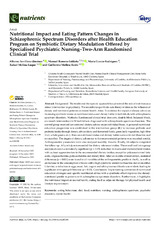Nutritional Impact and Eating Pattern Changes in Schizophrenic Spectrum Disorders after Health Education Program on Symbiotic Dietary Modulation Offered by Specialised Psychiatric Nursing–Two-Arm Randomised Clinical Trial
Autor
Molina Luque, Rafael
Sevillano-Jiménez, Alfonso
Romero Saldaña, Manuel
García Rodríguez, María
Molina Luque, Rafael
Molina Recio, Guillermo
Editor
MDPIFecha
2022Materia
Eating behaviourDiet
Food
Nutrition
Nursing
Schizophrenia spectrum
Psychotic disorders
Mental health
METS:
Mostrar el registro METSPREMIS:
Mostrar el registro PREMISMetadatos
Mostrar el registro completo del ítemResumen
Background: The traditional therapeutic approach has perceived the role of nutrition as a minor intervention in psychiatry. The microbiota–gut–brain axis theory evidences the influence of dietary and nutritional patterns on mental health. Aims: To evidence the impact of dietary advice on increasing symbiotic intake on nutritional status and dietary habits in individuals with schizophrenia spectrum disorders. Methods: Randomised clinical trial (two-arm, double-blind, balanced-block, six-month intervention) in 50 individuals diagnosed with schizophrenia spectrum disorders. The control group received conventional dietary advice on an individual basis. A personal nutritional education programme was established in the intervention group (IG) to increase prebiotic and probiotic intake through dietary advice (dairy and fermented foods, green leafy vegetables, high-fibre fruit, whole grains, etc.). Data on nutritional status and dietary habits were collected (baseline and six months). The degree of dietary adherence to the recommended patterns was recorded weekly. Anthropometric parameters were also analysed monthly. Results: Finally, 44 subjects completed the follow-up. All participants exceeded the dietary reference intakes. The overall and intra-group analysis showed a statistically significant (p < 0.05) reduction in macro and micronutrient intakes with a closer approximation to the recommended dietary intakes, except for polyunsaturated fatty acids, oligosaccharides, polysaccharides and dietary fibre. After six months of intervention, statistical differences (p < 0.001) were found in all variables of the anthropometric profile in the IG, as well as an increase in the consumption of foods with a high symbiotic content (at baseline and six months). Likewise, a reduction in eggs, meat, fish, sugars and ultra-processed foods was evident, leading to significant intra-group differences (p < 0.05). Conclusions: Implementing conventional nutritional education strategies and specific nutritional advice with a symbiotic effect improves the dietary-nutritional profile in patients with schizophrenia spectrum disorders. Furthermore, it highlights the nutritional impact on mental health, stating itself as adjuvant therapy for physical health and lifestyle improvement.

